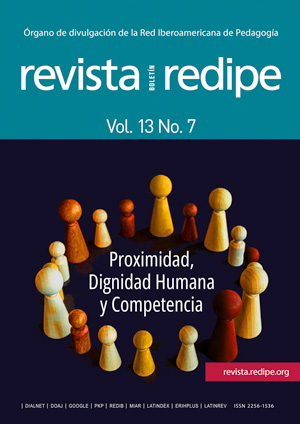La proximidad en E. Levinas
##plugins.themes.bootstrap3.article.main##
Keywords
Proximidad, Subjetividad, Responsabilidad, Alteridad, Ética
Resumen
El autor aborda en este trabajo la proximidad en la obra de E. Levinas. Para el autor lituano, la proximidad se identifica con la subjetividad, o la misma identidad del sujeto. La proximidad no tiene una connotación “espacial”, cerca o lejos; ni tampoco se limita a una presencia “cara a cara” con el otro; abarca al “tercero” que sobrepasa al tiempo y al espacio. Para Levinas, la proximidad no se da en un ser imaginario, ficticio, sino en un ser histórico, situado en el tiempo y en un contexto o circunstancia, en un ser de carne y sangre. La proximidad se da en un ser “asignado” al otro antes de toda elección o decisión; es una orden, un mandato que sólo al sujeto le incumbe y no puede rechazar sin poner en peligro su propia identidad. La proximidad la describe Levinas como un trastorno, una obsesión, un vuelco de nuestro psiquismo que rompe con nuestro letargo egoísta que nos impedía hacernos responsables del otro, quien nos libera de nuestro aislamiento ético. Es el otro (prójimo), desde la vulnerabilidad de su rostro, quien nos hace humanos. Para Levinas, el término proximidad es equivalente a subjetividad, responsabilidad, trascendencia, alteridad.
Referencias
Ayuso, J. M. (2015) Presentación de la edición española, en: Emmanuel Levinas Ética e infinito (Madrid, Machadolibros).
Bárcena, F. y Mêlich, J. C. (1999) La palabra del otro. Una crítica del principio de autonomía en educación, Revista Española de Pedagogía, 57, 214, pp. 466-483.
Chalier, C. (1995) Levinas. La utopía de lo humano (Barcelona, Riopiedras).
Hegel, G. W. (2005) Lecciones sobre la historia de la filosofía universal (Madrid, Tecnos).
Biesta, G. (2017) El bello riesgo de educar (Madrid, SM).
Cortina, A. (2021) Ética cosmopolita. Una apuesta por la cordura en tiempos de pandemia (Barcelona, Paidós).
González-Arnaíz, G. (2021) Ética y responsabilidad (Madrid, Tecnos).
González, C. A. (2023) El testimonio, su valor ético y pedagógico para responder al otro y mejorar al mundo, en: R. Mínguez y L Linares (coords.) La pedagogía de la alteridad (Barcelona, Octaedro), pp. 139-163.
Gutiérrez, M. y Pedreño, M. (2023) La responsabilidad en Levinas en clave pedagógica: hacia la construcción de un mundo más humano, en: R. Mínguez y L. Linares (coords.) La pedagogía de la alteridad (Barcelona, Octaedro), pp. 61- 87.
Levinas, E. (2011) De otro modo que ser o más allá de la esencia (Salamanca, Sígueme) 5ª edic.
Levinas, E. (2014) Alteridad y trascendencia (Madrid, Arenalibros).
Levinas, E. (2015) Ética e infinito (Madrid, Machadolibros).
Levinas, E. (1993) Entre nosotros (Valencia, Pre-textos).
Levinas, E. (2002) Totalidad e infinito. Ensayo sobre la exterioridad (Salamanca, Sígueme) 6ª edic.
Levinas, E,. (974) Humanismo del otro hombre (Madrid, Siglo XXI).
Levinas, E. (2007) De la existencia al existente (Madrid, Arenalibros).
Levinas, E. (2019) Dios, la muerte y el tiempo (Madrid, Cátedra) 9ª edic.
Matanky, E. (2018) The temptation of pedagogy: Levina´s educational thougt from his philosophical and confessional writings, The Journal of Moral Education, 52, 3, pp. 412-427.
Mate, R. (2011) Tratado de la injusticia (Barcelona, Anthropos).
Mate, R. (2018) El tiempo, tribunal de la historia (Madrid, Trotta).
Mêlich, J. C (2010) Ética de la compasión, (Barcelona, Herder).
Mêlich, J. C. (2002) Filosofía de la finitud (Barcelona, Herder).
Mêlich, J. C. (2021) La fragilidad del mundo (Barcelona, Tusquets).
Mínguez, R.; Romero, E. y Pedreño, Mª. (2016) La pedagogía del Otro: bases antropológicas e implicaciones educativas, Teoría de la Educación. Revista Interuniversitaria, 28, 2, pp. 116- 183.
Mínguez, R. y Espinosa, J. L. (2023) La compasión, principio de la pedagogía de la alteridad, en: R. Mínguez y L. Linares (coords.) La pedagogía de la alteridad, (Barcelona, Octaedro), pp. 113-139.
Ortega y Gasset, J. (1975) Historia como sistema (Madrid, Revista de Occidente) 7ª edic.



